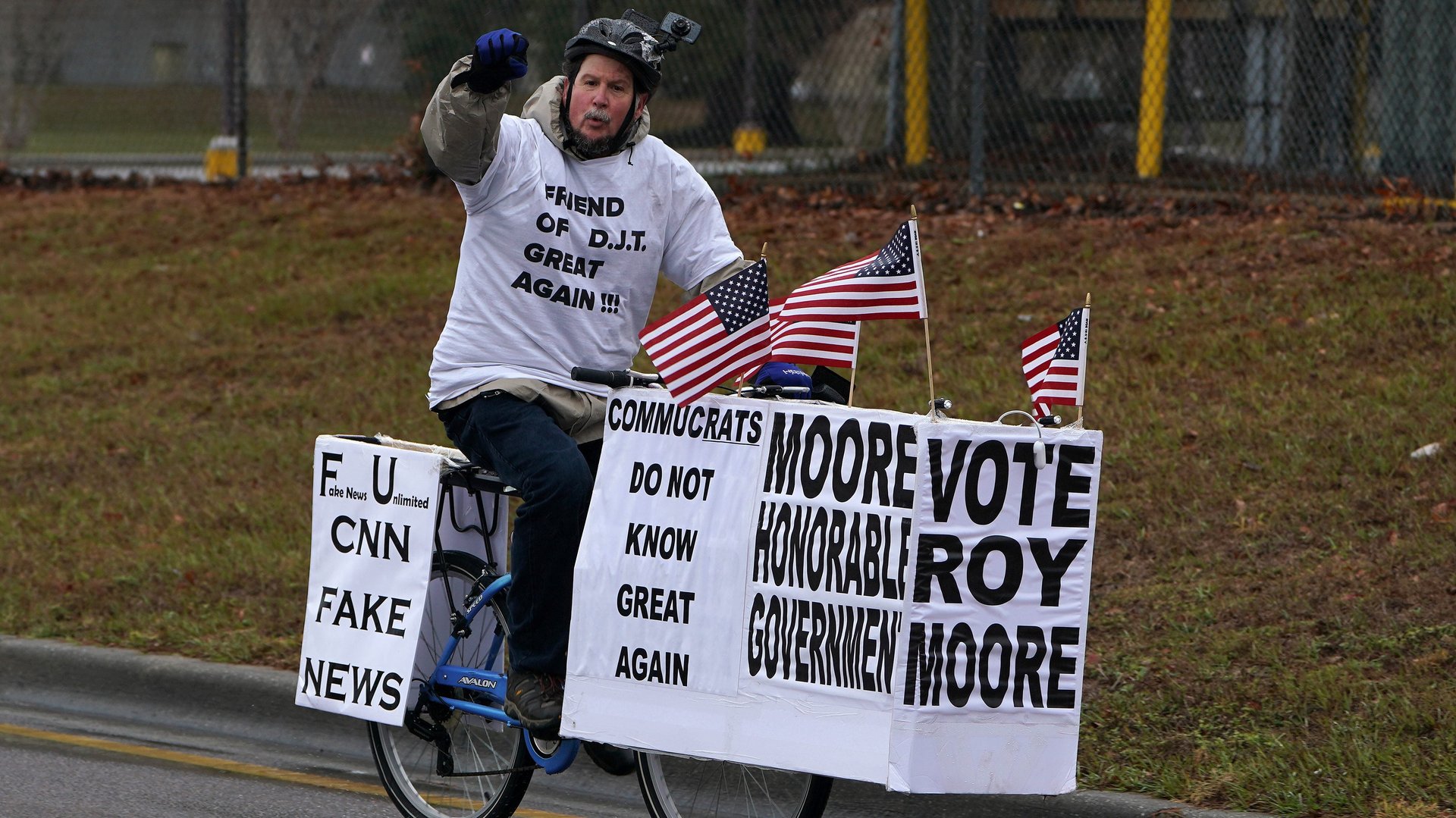Why Alabama’s senate election matters, and what you need to know
Americans all over the US are watching Alabama. The southern state is holding a special election today (Dec. 12) to pick a replacement for Jeff Sessions, who left his senate post earlier this year to become Donald Trump’s attorney general.


Americans all over the US are watching Alabama. The southern state is holding a special election today (Dec. 12) to pick a replacement for Jeff Sessions, who left his senate post earlier this year to become Donald Trump’s attorney general.
The race has dominated national news thanks to one of the contenders, Republican candidate and accused sex offender Roy Moore, backed by US president Donald Trump. Moore faces off against Democratic candidate Doug Jones, supported by former president Barack Obama. The race itself has taken national proportions, and has become a lighting rod for several national debates, from the #metoo groundswell to race to immigration.
For many, today’s vote in Alabama offers a public opinion gauge on topics central to the political future of the United States, with repercussions that spill well beyond its border. Here’s what you need to know, and what the race is expected to reveal:
Who are Roy Moore and Doug Jones?
Roy Moore, a former state judge, is a controversial figure for his views on homosexuality—he’s said it should be illegal—his crass attitudes towards ethnicities and religions other than his own, and a September statement he made describing America’s slavery era as “great.” More recently, a slew of accusations of sexual misconduct with teenage girls have surfaced. Moore denies those accusations.
His opponent is Doug Jones, a former US attorney who aligns with his party on issues such as universal healthcare and—importantly—abortion access. Jones is pro-choice.
For Republican voters, the election presents an existential choice: Do they vote for an accused pedophile, or a Democrat who backs policies they abhor?
How could Alabama’s vote change the balance of power in Washington, DC?
The election has practical implications in Congress. A Democratic win would represent a boost for that party in a Republican-dominated Washington D.C. In the House, Democrats hold 193 seats vs. Republicans 239. They are also outnumbered in the Senate, where they have 48 out of 100 votes.
Winning an extra vote would immediately give Democrats more leverage, and put them closer—both in numbers and psychologically—to getting a Senate majority in the 2018 mid-term elections.
Will Republicans get punished for dismissing the #metoo movement?
While the movement against sexual harassment by powerful men has scored some significant victories, its fallout in Washington D.C., particularly within the Republican party, is still nebulous. By electing Donald Trump, GOP voters have already demonstrated they’re willing to brush off claims of sexual harassment and assault of women. The allegations against Moore are even more egregious, given that the alleged victims were minors.
The Republican party, which has thrown its full support behind Moore, is betting voters will give him a pass as well. Opinion polls suggest many of them will do that. Some Alabama Republicans openly dismiss the accusations against Moore; others have told reporters that they’d rather have a questionable Republican in Congress than a Democrat.
The Democrats, meanwhile, have made a different calculation. They’ve come down against members of their own party accused of sexual misconduct—putting their limited power in Congress at risk. For example, their decision to pressure senator Al Franken into stepping down could lead to a loss of his seat to a Republican in 2018.
Tuesday’s election will shed light on the effectiveness of each approach. The stakes are high for Republicans, given the accusations against Trump. If Moore loses, it may be a sign that Trump too could eventually pay a political price for his treatment of women.
How strong is Donald Trump’s base?
The Alabama election is also about the president. Trump is wholeheartedly backing Moore. In the final days of the campaign, he’s stumped for him and recorded a robocall asking voters to pick Moore.
Moore represents the nativist, ultra-conservative wing of the Republican party that has become Trump’s base. Though Trump’s approval ratings have flagged, that core group of backers has remained committed to the president. The turnout for Moore will give an indication of how steadfast the support from that group is—and to what extent it can determine elections.
Though the Republican party as a whole is standing behind Moore, individual members have been peeling off. Alabama’s other senator, Richard Shelby, said that he had written in the name of a “distinguished” party member in his absentee ballot rather than voting for Moore. House representative Will Hurd, from Texas, called Moore “an abomination” to his party; Arizona senator Jeff Flake, another Republican, sent a $100 contribution to Moore’s Democratic opponent.
Can Democrats overcome the trends that lost them the White House?
Democrats have an uphill battle in Alabama, which voted for Trump by a wide margin—62%. During that election, many white, working-class voters defected from the Democratic party; meanwhile, black voter participation dropped.
Since then, the Trump presidency has sparked a wave of Democratic activism. The Alabama race will test its potential to turn out voters. African-Americans, which make up 27% of the state’s population, will be particularly important for Jones.
But will they make it to the polls? In recent years, Alabama’s bureaucratic barriers to voting have been accused of disenfranchising the state’s black and Latino voters. Jones’s campaign also alienated his own supporters with a crude flyer that attempted to appeal to black voters and backfired.
Democratic leaders have picked up Jones’s cause. Obama, for example, recorded his own robocall pressing Alabamans to go to the polls to support Jones. They seem to be making inroads, according to at least one poll. A Fox News survey conducted last week showed Jones had a 10-point lead over Moore.